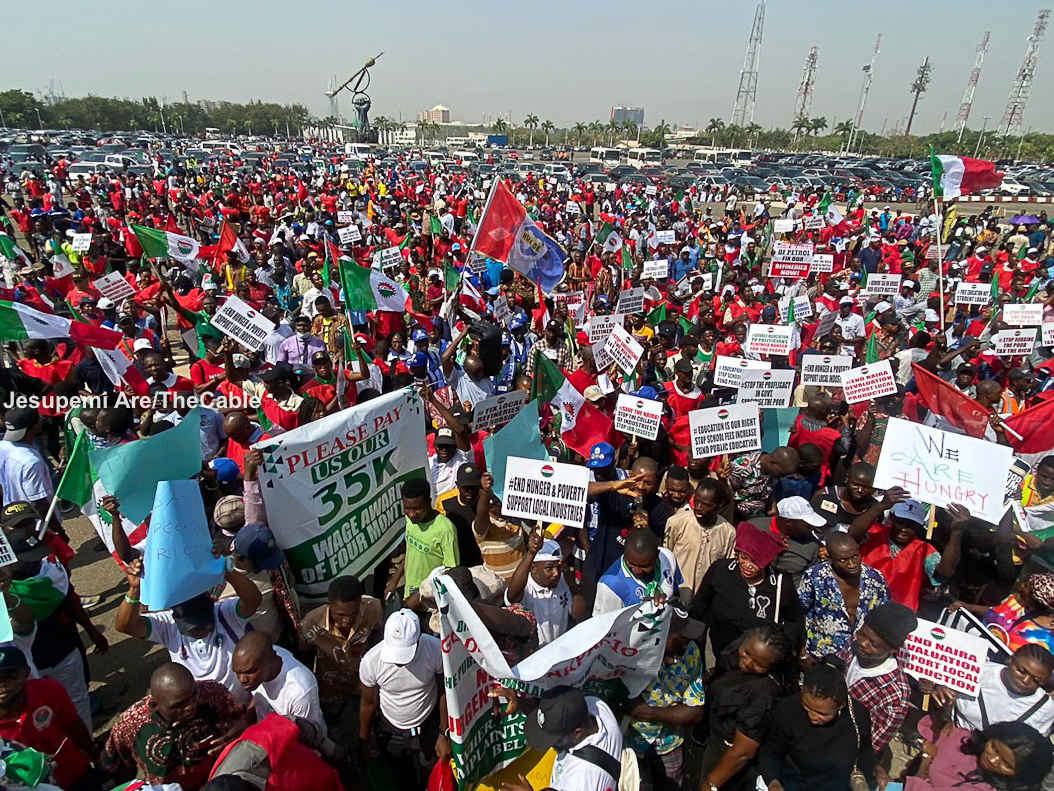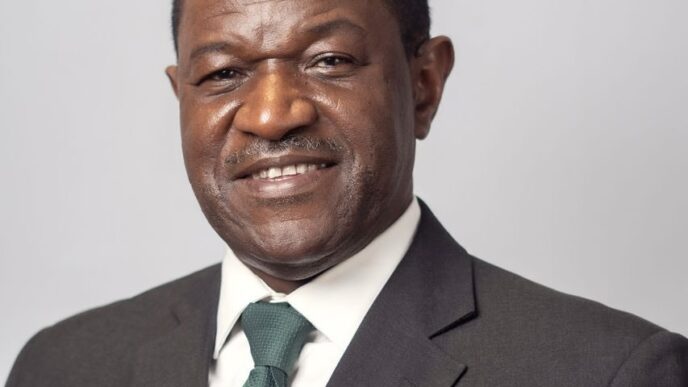NLC protest in Abuja
BY SAMUEL JEKELI
In recent months, the Nigerian workforce has once again found itself at the centre of a pressing national conversation—the implementation of a ₦70,000 minimum wage. For many citizens, especially those in low-income brackets, this policy represented not just a wage adjustment but a lifeline in an increasingly suffocating economy. Yet, despite public declarations and union agitations, implementation across several states and within the private sector remains largely symbolic, with little evidence of real, widespread adoption.
The cost of living in Nigeria has soared to unprecedented levels. A visit to the market paints a painful picture: a bag of rice that once cost ₦8,000 now sells for over ₦70,000, transportation costs have tripled, and essential services such as health care and education are slipping beyond the reach of the average citizen. Inflation has eroded purchasing power, and many full-time employees still live paycheck to paycheck, unable to meet basic needs. It is within this grim context that the ₦70,000 minimum wage was proposed—a seemingly sensible move to cushion workers from the blows of economic hardship.
However, this wage increase remains largely unimplemented. At the time of writing, at least 20 state governments, including Cross River, Enugu, Ebonyi, Yobe, Zamfara, Borno, Katsina, Nasarawa, and even the Federal Capital Territory (FCT), have not commenced payment of the new wage. The reasons vary—from claims of insufficient revenue to bureaucratic bottlenecks and political reluctance. Yet the consequences are the same: a demoralised, overburdened workforce that feels forgotten and undervalued.
Advertisement
Even in states that have begun implementation, inconsistencies abound. Some have started with select government ministries or senior staff, leaving lower cadre employees in limbo. In others, there are reports of deductions, delayed salaries, and confusion over whether the increase is a one-off adjustment or a new standard. These fragmented efforts betray the principle of a “national minimum wage”—which is, by definition, supposed to be uniform and binding.
The private sector tells a similar story. While some forward-thinking organisations have reviewed their pay structures in alignment with the new proposal, many others continue to offer wages that fall far below the ₦70,000 threshold. Small and medium-sized enterprises (SMEs) cite narrow profit margins and economic uncertainty as barriers to implementation. For multinational companies, the excuse often lies in uniform global wage structures that are slow to adjust to local developments. Still, in both cases, the result is an uneven and unfair compensation landscape that leaves the average worker shortchanged.
One cannot ignore the long-term risks of this non-implementation. A demotivated workforce is an unproductive one. Poor remuneration leads to high turnover, absenteeism, and reduced efficiency. Moreover, the psychological toll of working without earning enough to survive is immense. It breeds resentment, mental fatigue, and in some cases, fuels the rise of informal and illicit economies. In public institutions, it can translate to poor service delivery, corruption, and unrest. In private businesses, it weakens competitiveness, as skilled labour gradually seeks greener pastures elsewhere.
Advertisement
What makes this situation more troubling is that the ₦70,000 minimum wage is not an arbitrary figure. It was calculated against economic indicators and intended to reflect a living wage—one that allows workers to cover essential needs, support dependents, and live with dignity. If the government and private employers alike cannot deliver this, the question then becomes: how sustainable is our labour system?
Of course, one must acknowledge the financial constraints many states face. Internally generated revenue (IGR) remains low in several regions, and federal allocations have often been inconsistent or insufficient. But even within these constraints, implementation is not impossible—it is a matter of priority. Many states continue to spend lavishly on political appointments, overseas trips, and nonessential projects while postponing critical welfare reforms. Redirecting funds, plugging leakages, and adopting innovative budgeting approaches could create room for better wage compliance.
At the federal level, stronger oversight mechanisms are needed. The National Salaries, Incomes and Wages Commission (NSIWC), alongside labour unions and civil society organisations, must work collaboratively to ensure full compliance. Transparency should be non-negotiable, and a detailed national wage compliance report should be published quarterly to hold state governments accountable.
For private businesses, a shift in mindset is essential. Workers are not just cost centres—they are the engines of value creation. Investing in fair wages is not just morally sound; it is strategically wise. Numerous studies have shown that companies with equitable pay practices enjoy higher employee retention, improved performance, and better public perception. Wage fairness is not an act of charity—it is a smart business decision.
Advertisement
The Nigerian economy cannot grow on the backs of underpaid workers. Neither can national stability be assured in an environment where millions toil daily without hope of upward mobility. The ₦70,000 minimum wage, if fully implemented, could be a significant step toward a more just, resilient, and productive society. But until that happens, it remains what it currently is: a promise on paper, not yet a reality.
The time for lip service is over. Workers deserve more than applause—they deserve action. The minimum wage must move from proposal to practice, and from headlines to households.
Samuel Jekeli writes from Centre for Social Justice, Abuja. He can be contacted via [email protected]
Advertisement
Views expressed by contributors are strictly personal and not of TheCable.










